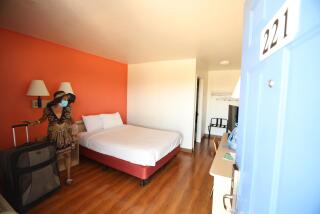NIMBYs stop a hotel from housing sick homeless people in Orange County
- Share via
When the sprawling Laguna Woods Village retirement community in south Orange County got word that the county Board of Supervisors had leased the nearby Ayres Hotel to house homeless people who tested positive for COVID-19, residents there sprang into action. They quickly mobilized a protest campaign that included emails, a demonstration in front of the hotel and a lawsuit to stop the planned use.
Before the court could weigh in, the hotel’s owners asked county leaders to let them out of their contract, citing their concerns for their neighbors, and the county agreed. The retirement community’s newsletter offered congratulations all around.
There’s no question there was some shameless obstructionism going on here. In a week’s time, the community scotched a desperately needed homeless shelter project at a time when older, impoverished people with underlying medical conditions — the profile of a big chunk of the homeless community across California — are particularly susceptible to getting seriously ill if they are infected with the novel coronavirus.
But the residents of Laguna Woods Village fit parts of that profile, too, although they’re far from homeless. Everyone in the community of 18,800 is age 55 or older; the median age is 76. In that age group, they have every right to fear getting COVID-19. “We are not anti-homeless,” said Eileen Paulin, the director of media and communications for the village residents and their multiple boards of directors. “The story on these people is that they are scared to death.”
Part of the problem, says Paulin, is that the plan was announced before the residents knew much about it. But this is an emergency, and officials need to respond quickly to the threat posed by the coronavirus. There’s not a lot of time to go over every element of every plan with everyone who might be affected.
The Ayres Hotel project was just part of the county’s larger effort to set up a number of hotels and motels to shelter homeless people, with separate facilities for those who have not tested positive for the virus and those who have. Projects like the Ayres Hotel were also intended to relieve some of the burden on local hospitals. Homeless people with COVID-19 can’t be sent home to isolate themselves. They have no homes.
In fact, the Ayres Hotel — which is about half a mile from the cluster of residences that makes up the village — would have been run by the service organization, the Illumination Foundation, which has experience in recuperative care. People living there would have been fed and cared for by nurses equipped to do basic medical monitoring. No one would have been allowed to wander outside, and if a person insisted on venturing beyond the enclosed hotel courtyard, he or she would have been returned to wherever they had been before.
“The people we are seeing are sick,” said the foundation’s chief executive, Paul Leon. “They don’t want to go out.” Leon’s foundation has started to run another hotel — also owned by the Ayres Hotel company — in another part of the county for homeless people who have tested positive for COVID-19. It’s only near a mall — so no protests.
Would the hotel residents or its staff have posed a danger to the retirement village residents? There are risks everywhere to everyone from this insidious virus; it’s worth noting that the stores in the area are presumably frequented already by workers from Saddleback Medical Center, who may certainly have been exposed to COVID-19. The issue is how to stop the disease’s rampage and help those who have it get better. Providing private rooms for homeless people who test positive limits contagion and reduces the strain on hospitals.
When it comes to the homeless population, cities and counties everywhere have to get them sheltered and find places for them to isolate if they become infected. The sooner they do so, the sooner they lower the potential for contagion — not just among homeless people, but in the general population.
Residents of Pacific Palisades raised a similar outcry against the city of Los Angeles sheltering homeless people — who were not positive for the virus — in the Palisades Recreation Center. As it turns out, the city probably won’t even need to use that recreation center for a shelter. Nevertheless, elected officials — and the businesses that have stepped up to answer the calls for help — need to stand their ground against NIMBYs. We don’t have the luxury of tolerating them now.
More to Read
A cure for the common opinion
Get thought-provoking perspectives with our weekly newsletter.
You may occasionally receive promotional content from the Los Angeles Times.









